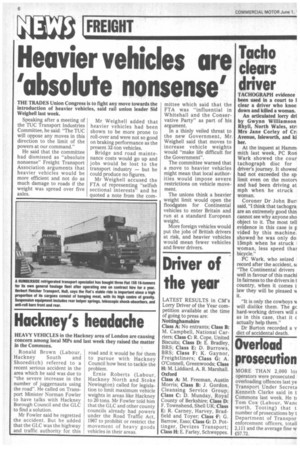Aja FREIGHT
Page 8

If you've noticed an error in this article please click here to report it so we can fix it.
Heavier vehicles are 'absolute nonsense'
THE TRADES Union Congress is to fight any move towards the introduction of heavier vehicles, said rail union leader Sid Weighell last week.
Speaking after a meeting of the TUC Transport Industries Committee, he said: "The TUC will oppose any moves in this direction to the limit of the powers at our command."
He said that the committee had dismissed as "absolute nonsense" Freight Transport Association arguments that heavier vehicles would be more efficient and not do as much damage to roads if the weight was spread over five axles. Mr Weighell added that heavier vehicles had been shown to be more prone to roll-over and were not so good on braking performance as the present :32-ton vehicles.
Bridge and road maintenance costs would go up and jobs would be lost to the transport industry — but he could produce no figures.
Mr Weighell accused the FTA of representing "selfish sectional interests" and he quoted a note from the corn mittee which said that the FTA was "influential in Whitehall and the Conservative Party" as part of his argument.
In a thinly veiled threat to the new Government, Mr Weighell said that moves to increase vehicle weights would "make life difficult for the Government".
The committee warned that a move to heavier vehicles might mean that local authorities would impose severe restrictions on vehicle movement.
The unions think a heavier weight limit would open the floodgates for Continental vehicles to enter Britain and run at a standard European weight.
More foreign vehicles would put the jobs of British drivers at risk, and heavier vehicles would mean fewer vehicles and fewer drivers.












































































































